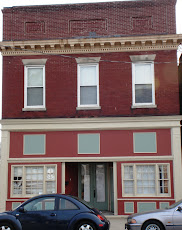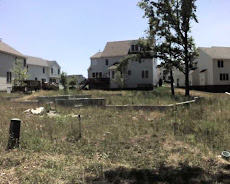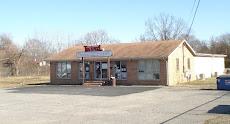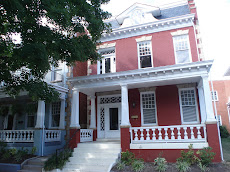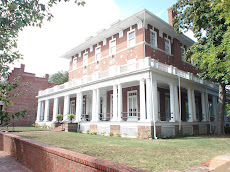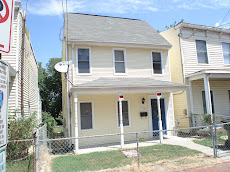Real-life classroom
March 31, 2010 by Kaitlin Mayhew
A handful of urban planning graduate students at VCU are studying how a recently closed school in the West End could be converted into something more productive.
The old Westhampton School at Patterson and Libbie will likely be sold by the city in the near future, and students at VCU are researching the best use for the property.
The Richmond Community High School vacated the site after facing lawsuits filed because the buildings were deemed not accessible last year, and the city is considering future uses for the building, which was appraised at $7.5 million last year.
According to the city’s asset management division, the school is not listed, and a timeline has not been determined. The department spokesperson said the sale will likely be conducted by a competitive request for proposal process. Potential buyers have expressed interest to the city.
Morton Gulak’s urban planning students are studying ways to use the property.
According to Gulak, this is not an unusual project for his students.
Every year, VCU urban planning students take on a real world project as a kind of senior thesis project.
Gulak, along other faculty members, and Justine Roberts, a programs manager for Richmond’s department of economic and community development, worked to make the project available for the students.
“She thought that this would be good for the students as well as for the city,” Gulak said.
Four of Gulak’s students are each tackling a different job in the planning process: building feasibility, sustainability, urban design issues and market analysis.
“They’re looking at the site the building is on, but in relation to the surrounding area,” Gulak said. “For example, if housing goes in, what retail needs would there be?”
Gulak said that the students are ultimately going to come up with three options for the building. A panel of faculty members and representatives from the city will judge the choices.
Gulak believes that the work his students are doing will affect the choice the city ultimately makes.
“I think, yes, it could be very helpful,” Gulak said. “I think they’re looking at it in a specific way, such as what changes should be made to improve the community.”
The students began their project in January and will finish and present their ideas in early May.
Gulak said that as of now he doesn’t know exactly what his students will decide for the site, but that they will have ideas within the next few weeks.
“We have done this for years,” Gulak said of the projects. “They help the communities that these [sites] exist in, and it certainly helps the students.”
Wednesday, March 31, 2010
Tuesday, March 30, 2010
For my Williamsburg people - new gym in New Town
Expanding east on Route 60
March 30, 2010 by Aaron Kremer
If you drop commercial real estate rents low enough, they will sign.
Richmond-based gym operator American Family Fitness is expanding to Williamsburg, where the company will open a 23,000-square-foot gym in the New Town area. (New Town is sort of like West Broad Village)
Brian Evans, the company’s chief executive, said he had been in discussions for at least a year, but then rents dropped and he went ahead and signed.
“The lease rate, that was the final decision-maker,” he said.
He didn’t disclose the exact rent but said it’s about half of what existing tenants are paying in that area.
“We felt the area needed a fitness center,” Evans said. “The good thing about this for us: The overhead is low. It’s not a highly capitalized project, and the risk is a lot lower.”
AFF is renting space in the shopping center as opposed to building from scratch. The company is also currently constructing a 78,000-square-foot gym on Midlothian Turnpike in Chesterfield, which will open in early August, according to Evans.
This is the chain’s first foray into Hampton Roads. AFF has a gym in Fredericksburg and seven gyms around Richmond.
Evans said he expects the Williamsburg gym to hire about 40 employees.
The gym business in Richmond appears to be holding steady despite the recession. Midlothian Athletic Club (formerly Robious Sports & Fitness) is undergoing a million-dollar renovation, and the Gold’s Gym at Willow Lawn has applied for a building permit to add a pool.
“People today value maintaining their health,” Evans said. “They realize that it’s probably about the last thing they should give up … the dues you pay for a month equal one night out with a family, even less for single members.”
March 30, 2010 by Aaron Kremer
If you drop commercial real estate rents low enough, they will sign.
Richmond-based gym operator American Family Fitness is expanding to Williamsburg, where the company will open a 23,000-square-foot gym in the New Town area. (New Town is sort of like West Broad Village)
Brian Evans, the company’s chief executive, said he had been in discussions for at least a year, but then rents dropped and he went ahead and signed.
“The lease rate, that was the final decision-maker,” he said.
He didn’t disclose the exact rent but said it’s about half of what existing tenants are paying in that area.
“We felt the area needed a fitness center,” Evans said. “The good thing about this for us: The overhead is low. It’s not a highly capitalized project, and the risk is a lot lower.”
AFF is renting space in the shopping center as opposed to building from scratch. The company is also currently constructing a 78,000-square-foot gym on Midlothian Turnpike in Chesterfield, which will open in early August, according to Evans.
This is the chain’s first foray into Hampton Roads. AFF has a gym in Fredericksburg and seven gyms around Richmond.
Evans said he expects the Williamsburg gym to hire about 40 employees.
The gym business in Richmond appears to be holding steady despite the recession. Midlothian Athletic Club (formerly Robious Sports & Fitness) is undergoing a million-dollar renovation, and the Gold’s Gym at Willow Lawn has applied for a building permit to add a pool.
“People today value maintaining their health,” Evans said. “They realize that it’s probably about the last thing they should give up … the dues you pay for a month equal one night out with a family, even less for single members.”
Thursday, March 18, 2010
Richmond needs more bandwith from Google
Richmond competing for Google’s ultra high speed broadband
March 18, 2010 by Aaron Kremer
Google, Google, where art thou Google.
The City of Richmond has joined a growing list of municipalities hoping tech giant Google picks it for a new a high-speed broadband experiment that could increase Internet surf times by 100.
“The city that wins this project will be recognized globally and the impact it will have is the technological equivalent of being awarded the Olympics,” said Mayor Dwight Jones in a press release.
According to a website established to drum up local interest in the contest, Richmond is a perfect test market. And the local web/marketing community volunteered to build a website and activate social media outlets.
“We’re a small-sized big city with a diversity in population and geography that statistically mirrors the United States as a whole,” the website says.
More than 80 other municipalities have already applied including Charlottesville, Virginia Beach, James City County and Williamsburg / York Counties. And a handful are resorting to extreme gimmicks to bring home the victory. The city of Topeka, Kan, renamed itself Google for the month of March. Meanwhile the mayor of Duluth, Minn jumped into Lake Superior.
Richmond won’t cheapen itself that much, said Andreas Addison, a budget analyst for the city who is helping spearhead the project. But there will be a 3-minute video coming out next week.
“We want to be considered a serious contender,” Addison said, adding that the increased bandwidth could be helpful for the healthcare and educational institutions.
“We do not want to poke fun. We want to show how Richmond doesn’t need to do that, and Google should want to pick Richmond.”
The deadline for applications is March 26. But so far, details of exactly what Google will provide and what it will cost is unclear. According to a Wall Street Journal story from earlier this week, there are more questions than answers.
According to the story at least one city – San Francisco – said the cost of building the network would be prohibitive, about $1,500 per home or more than $200 million for a city with 500,000.
In a separate MarketWatch column, one analyst said that the contest could become a bidding war akin to what states do with tax incentives. “If you get a bidding war going, you might find out that the winning city ends up paying more of this than they expected.”
It’s also unclear how much faster internet service might benefit an area.
Addison said that while Google has not shared any specific details, he believes that the city would potentially make some money if Google paid for conduits and equipment under the ground as well as the use of telephone poles like Comcast and Verizon have to do.
March 18, 2010 by Aaron Kremer
Google, Google, where art thou Google.
The City of Richmond has joined a growing list of municipalities hoping tech giant Google picks it for a new a high-speed broadband experiment that could increase Internet surf times by 100.
“The city that wins this project will be recognized globally and the impact it will have is the technological equivalent of being awarded the Olympics,” said Mayor Dwight Jones in a press release.
According to a website established to drum up local interest in the contest, Richmond is a perfect test market. And the local web/marketing community volunteered to build a website and activate social media outlets.
“We’re a small-sized big city with a diversity in population and geography that statistically mirrors the United States as a whole,” the website says.
More than 80 other municipalities have already applied including Charlottesville, Virginia Beach, James City County and Williamsburg / York Counties. And a handful are resorting to extreme gimmicks to bring home the victory. The city of Topeka, Kan, renamed itself Google for the month of March. Meanwhile the mayor of Duluth, Minn jumped into Lake Superior.
Richmond won’t cheapen itself that much, said Andreas Addison, a budget analyst for the city who is helping spearhead the project. But there will be a 3-minute video coming out next week.
“We want to be considered a serious contender,” Addison said, adding that the increased bandwidth could be helpful for the healthcare and educational institutions.
“We do not want to poke fun. We want to show how Richmond doesn’t need to do that, and Google should want to pick Richmond.”
The deadline for applications is March 26. But so far, details of exactly what Google will provide and what it will cost is unclear. According to a Wall Street Journal story from earlier this week, there are more questions than answers.
According to the story at least one city – San Francisco – said the cost of building the network would be prohibitive, about $1,500 per home or more than $200 million for a city with 500,000.
In a separate MarketWatch column, one analyst said that the contest could become a bidding war akin to what states do with tax incentives. “If you get a bidding war going, you might find out that the winning city ends up paying more of this than they expected.”
It’s also unclear how much faster internet service might benefit an area.
Addison said that while Google has not shared any specific details, he believes that the city would potentially make some money if Google paid for conduits and equipment under the ground as well as the use of telephone poles like Comcast and Verizon have to do.
Wednesday, March 10, 2010
Builders and realtors looking optimistic about spring housing market
By Carol Hazard
Published: March 10, 2010
Richmond-area Realtors and homebuilders are gearing up for the spring market, typically the busiest time of the year for home sales.
“The general feeling is the worst is behind us,“ said Kevin McNulty, president of the Home Building Association of Richmond and president of LifeStyle Builders & Developers Inc.
“There are some indications that this will be a better spring market than last year,“ he said.
More people are out looking at houses, and contracts are being written, he said.
“There is some optimism,“ McNulty said, pointing to the expansion at Fort Lee, the construction of the Rolls-Royce plant in Prince George County, and the recent offer by a Kansas company to buy the Qimonda site in Henrico County.
Hoping to keep recent momentum going, the Home Building Association of Richmond and the Richmond Association of Realtors have started new Web sites. The industry is coming off one of the worst years in recent history for new and previously owned home sales.
The homebuilders’ site, launched Monday, is RightHouseRightNow.com. It will feature about 200 new homes by week’s end, McNulty said.
The Realtors’ site, REsourceHome.com, includes a home-sale search and community information on Richmond and 12 localities. The site is not just for sellers and buyers; it contains household tips and information about services for homeowners.
Both sites prominently feature information about tax credits for first-time and move-up buyers, which are set to expire April 30. Houses must be under contract by that date to qualify, and the deals must be closed by June 30.
An $8,000 tax credit is available for first-time buyers or for someone who has not owned a principal residence in the past three years. A $6,500 credit is on the table for buyers who have owned or lived in their houses for five consecutive years in the past eight years.
Karen Tilson Smith of RE/MAX Commonwealth, president of the Richmond Association of Realtors, said the tax credits will help jump-start the spring home-buying market.
“We have seen an uptick in activity, which has helped relieve some anxiety with sellers,“ Smith said.
The inventory of homes for sale in the Richmond area at the end of February was 9,113, up nearly 200 from the same month a year ago but not as high as the peak of 9,490 in July—a sign of stabilization in the market.
Also, 559 homes sold in the Richmond area in February, up 14.3 percent from the same month a year ago, according to the Richmond Association of Realtors.
“It’s still a tough market, although I am seeing some improvements in key indicators,“ said Tom Tyler, a senior analyst with Integra Realty Resources Richmond, a commercial real estate consulting and research firm.
Closings of previously owned homes in eight localities in the Richmond area rose 40 percent in the fourth quarter from the same period a year ago, he said. The area includes Richmond and the counties of Caroline, Chesterfield, Goochland, Hanover, Henrico, New Kent and Powhatan.
“And it appears [home-building] permits are stabilizing as well,“ Tyler said.
Permits fell 1 percent in the same time periods, a dramatic improvement from the previous year when they dropped 45 percent from October through December in 2008 from the same three-month period in 2007.
“The [home-building] market is not coming back, but it is stabilizing,“ Tyler said. “Stabilization is likely to continue throughout this year with meaningful improvement possible in 2011.“
Published: March 10, 2010
Richmond-area Realtors and homebuilders are gearing up for the spring market, typically the busiest time of the year for home sales.
“The general feeling is the worst is behind us,“ said Kevin McNulty, president of the Home Building Association of Richmond and president of LifeStyle Builders & Developers Inc.
“There are some indications that this will be a better spring market than last year,“ he said.
More people are out looking at houses, and contracts are being written, he said.
“There is some optimism,“ McNulty said, pointing to the expansion at Fort Lee, the construction of the Rolls-Royce plant in Prince George County, and the recent offer by a Kansas company to buy the Qimonda site in Henrico County.
Hoping to keep recent momentum going, the Home Building Association of Richmond and the Richmond Association of Realtors have started new Web sites. The industry is coming off one of the worst years in recent history for new and previously owned home sales.
The homebuilders’ site, launched Monday, is RightHouseRightNow.com. It will feature about 200 new homes by week’s end, McNulty said.
The Realtors’ site, REsourceHome.com, includes a home-sale search and community information on Richmond and 12 localities. The site is not just for sellers and buyers; it contains household tips and information about services for homeowners.
Both sites prominently feature information about tax credits for first-time and move-up buyers, which are set to expire April 30. Houses must be under contract by that date to qualify, and the deals must be closed by June 30.
An $8,000 tax credit is available for first-time buyers or for someone who has not owned a principal residence in the past three years. A $6,500 credit is on the table for buyers who have owned or lived in their houses for five consecutive years in the past eight years.
Karen Tilson Smith of RE/MAX Commonwealth, president of the Richmond Association of Realtors, said the tax credits will help jump-start the spring home-buying market.
“We have seen an uptick in activity, which has helped relieve some anxiety with sellers,“ Smith said.
The inventory of homes for sale in the Richmond area at the end of February was 9,113, up nearly 200 from the same month a year ago but not as high as the peak of 9,490 in July—a sign of stabilization in the market.
Also, 559 homes sold in the Richmond area in February, up 14.3 percent from the same month a year ago, according to the Richmond Association of Realtors.
“It’s still a tough market, although I am seeing some improvements in key indicators,“ said Tom Tyler, a senior analyst with Integra Realty Resources Richmond, a commercial real estate consulting and research firm.
Closings of previously owned homes in eight localities in the Richmond area rose 40 percent in the fourth quarter from the same period a year ago, he said. The area includes Richmond and the counties of Caroline, Chesterfield, Goochland, Hanover, Henrico, New Kent and Powhatan.
“And it appears [home-building] permits are stabilizing as well,“ Tyler said.
Permits fell 1 percent in the same time periods, a dramatic improvement from the previous year when they dropped 45 percent from October through December in 2008 from the same three-month period in 2007.
“The [home-building] market is not coming back, but it is stabilizing,“ Tyler said. “Stabilization is likely to continue throughout this year with meaningful improvement possible in 2011.“
Monday, March 1, 2010
Open Discussion on how to bring people in the city to enjoy all that we have to offer
March 1, 2010 by Andy Taylor
There are no walls blocking the way, no tolls at the city line and no security checkpoints to clear when driving into Richmond from the suburbs.
So why don’t more people come here to take advantage of what the city has to offer?
That was the question a group of business people and academics attempted to answer in an all-day session Friday at the University of Richmond’s downtown campus.
The program, Frontier Sessions, was hosted by The Frontier Project, a Shockoe Bottom-based consulting company that specializes in leadership and strategy.
The focus session was done as part of the company’s pro-bono mission of donating 15 percent of its work to the community, said Frontier Project founder Scott Wayne. This is the first Frontier Sessions program the company has done, he said.
The panel consisted of eight people invited in and four principals from The Frontier Project.
“We did not invite the mayor’s office, or the governor’s office or Venture Richmond,” Wayne said. “It’s not that we have anything against them, it’s just that we wanted to take a completely fresh look.”
Panelists brainstormed on why people might not want to come to town, what can be done make the city more attractive for them, and at the end of the day came up with a recommendation list of things that can be done to change the behavior.
Members of the group didn’t know each other before Friday’s meeting. They were picked because they had knowledge or experience that would enhance the discussion, said Corey Dyckman, a Frontier Project principal. They were not there speaking on behalf of their companies, he said.
In a free-flowing conversation, with some nudging from Wayne, the panel was asked to name their favorite cities or describe what qualities they looked for in a city.
Judy Mejia, who heads the downtown UR campus, said Manhattan. “I love the idea that you could be shopping in the middle of the city.” She also cited public transportation, which she said Richmond is lacking.
Matt O’Sickey, who works at Tredegar, selected New Orleans, London and Shanghai, because “they are all incredibly modern, yet capture a sense of history.”
Derek Mueller, who works at Altria, believes a good city depends on the number of non-chain restaurants.
“My favorite cities are ones that have a sense of localness,” said Chris McDaniel, who works at the Federal Reserve Bank of Richmond. “I don’t want to be on the West Broad Street of a city.”
Dyckman mentioned that the city lacks a central gathering place. Others joined in on that theme and as the conversation careened from one topic to another.
The group determined Monroe Park and other city parks are treasures but they are underutilized. They pointed out the attraction of the river downtown but said it would lure more visitors with things such as bike and kayak rentals and food concessions.
There was talk of taking Boston’s Freedom Trail model and using it here with the slave trail and other historical sites connected to the Revolutionary War, the Civil War, Civil Rights and religious freedom. Like with the Freedom Trail, the thinking was that it could be a good idea to paint a line along the route for visitors to follow.
The ideas on why people don’t come into town ranged from parking issues, safety fears, not having good central place for getting information on many of the things that are happening here, and annoyances like having to walk by street musicians who are asking for money.
A recommendation came out of that to have the city create stations for musicians on the Canal Walk and other parts of town and get sponsors to pay them to play instead of having them rely on donations.
As the day went on, the group went through various break-out sessions where they identified target groups – such as young professional women, retirees, families with children, quiet intellectuals, teenagers, outdoors types, sports enthusiasts, art lovers – and came up with strategies on how to attract them to the city.
Here are some of the recommendations the group came up with. More will be finalized in follow up meetings.
• Ask Mayor Dwight Jones to consider building a skateboard park downtown rather than the outdoor ice rink he has proposed. The thinking is this would bring in young people and be a year-round attraction, rather than seasonal.
• Come up with a book-of-the-month for the entire metro area. This would be something to create a common interest for people from all of the localities. This is something that is being done in Dublin, Ireland.
• Approach GRTC about establishing a circulator that people from the suburbs could ride in to tourist attractions.
• Create the slavery, independence and Civil War trail.
• Get the city to issue permits for street concessions in places such as the Canal Walk and Monroe Park.
• Find corporate sponsors to donate bicycle parking racks for the downtown river area and other parts of town.
“Our job is to make some people change their behavior in a positive way,” Wayne said.
He said his expectations for what Frontier Sessions might accomplish is tempered but “let’s say we come up with 15 recommendations and three happen. Wouldn’t that be terrific?”
Wayne said it is key that the group set its sights on small goals that can be quickly achieved with little expense.
“This is a city where people get caught up in baseball debates, which is fine, but in the meantime let’s build a skate park.”
There are no walls blocking the way, no tolls at the city line and no security checkpoints to clear when driving into Richmond from the suburbs.
So why don’t more people come here to take advantage of what the city has to offer?
That was the question a group of business people and academics attempted to answer in an all-day session Friday at the University of Richmond’s downtown campus.
The program, Frontier Sessions, was hosted by The Frontier Project, a Shockoe Bottom-based consulting company that specializes in leadership and strategy.
The focus session was done as part of the company’s pro-bono mission of donating 15 percent of its work to the community, said Frontier Project founder Scott Wayne. This is the first Frontier Sessions program the company has done, he said.
The panel consisted of eight people invited in and four principals from The Frontier Project.
“We did not invite the mayor’s office, or the governor’s office or Venture Richmond,” Wayne said. “It’s not that we have anything against them, it’s just that we wanted to take a completely fresh look.”
Panelists brainstormed on why people might not want to come to town, what can be done make the city more attractive for them, and at the end of the day came up with a recommendation list of things that can be done to change the behavior.
Members of the group didn’t know each other before Friday’s meeting. They were picked because they had knowledge or experience that would enhance the discussion, said Corey Dyckman, a Frontier Project principal. They were not there speaking on behalf of their companies, he said.
In a free-flowing conversation, with some nudging from Wayne, the panel was asked to name their favorite cities or describe what qualities they looked for in a city.
Judy Mejia, who heads the downtown UR campus, said Manhattan. “I love the idea that you could be shopping in the middle of the city.” She also cited public transportation, which she said Richmond is lacking.
Matt O’Sickey, who works at Tredegar, selected New Orleans, London and Shanghai, because “they are all incredibly modern, yet capture a sense of history.”
Derek Mueller, who works at Altria, believes a good city depends on the number of non-chain restaurants.
“My favorite cities are ones that have a sense of localness,” said Chris McDaniel, who works at the Federal Reserve Bank of Richmond. “I don’t want to be on the West Broad Street of a city.”
Dyckman mentioned that the city lacks a central gathering place. Others joined in on that theme and as the conversation careened from one topic to another.
The group determined Monroe Park and other city parks are treasures but they are underutilized. They pointed out the attraction of the river downtown but said it would lure more visitors with things such as bike and kayak rentals and food concessions.
There was talk of taking Boston’s Freedom Trail model and using it here with the slave trail and other historical sites connected to the Revolutionary War, the Civil War, Civil Rights and religious freedom. Like with the Freedom Trail, the thinking was that it could be a good idea to paint a line along the route for visitors to follow.
The ideas on why people don’t come into town ranged from parking issues, safety fears, not having good central place for getting information on many of the things that are happening here, and annoyances like having to walk by street musicians who are asking for money.
A recommendation came out of that to have the city create stations for musicians on the Canal Walk and other parts of town and get sponsors to pay them to play instead of having them rely on donations.
As the day went on, the group went through various break-out sessions where they identified target groups – such as young professional women, retirees, families with children, quiet intellectuals, teenagers, outdoors types, sports enthusiasts, art lovers – and came up with strategies on how to attract them to the city.
Here are some of the recommendations the group came up with. More will be finalized in follow up meetings.
• Ask Mayor Dwight Jones to consider building a skateboard park downtown rather than the outdoor ice rink he has proposed. The thinking is this would bring in young people and be a year-round attraction, rather than seasonal.
• Come up with a book-of-the-month for the entire metro area. This would be something to create a common interest for people from all of the localities. This is something that is being done in Dublin, Ireland.
• Approach GRTC about establishing a circulator that people from the suburbs could ride in to tourist attractions.
• Create the slavery, independence and Civil War trail.
• Get the city to issue permits for street concessions in places such as the Canal Walk and Monroe Park.
• Find corporate sponsors to donate bicycle parking racks for the downtown river area and other parts of town.
“Our job is to make some people change their behavior in a positive way,” Wayne said.
He said his expectations for what Frontier Sessions might accomplish is tempered but “let’s say we come up with 15 recommendations and three happen. Wouldn’t that be terrific?”
Wayne said it is key that the group set its sights on small goals that can be quickly achieved with little expense.
“This is a city where people get caught up in baseball debates, which is fine, but in the meantime let’s build a skate park.”
Subscribe to:
Posts (Atom)


























